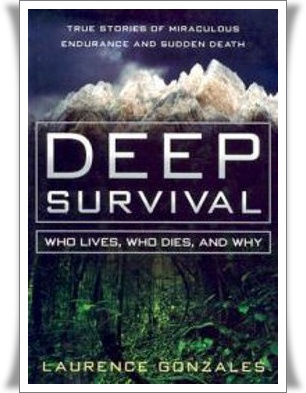Mental Survival
The importance of coping with a catastrophic event and learning mental survival techniques is just as important as knowing the physical aspects of survival skills, such as obtaining water, food and shelter. People who are already involved in the survivalist lifestyle have begun coping productively with the possibility of nuclear war, climatic disasters, economic collapse, terrorist attacks and epidemics by stocking items necessary for survival and learning a variety of survival skills.
Stress
Many people are not "preppers" and would have no idea how to manage their physical or mental well-being following a disaster. The enormous amount of stress exerted on unprepared individuals following a catastrophe would create a myriad of destructive emotional responses requiring assistance by mental health workers, of which there might not be any around in a PAW (post-apocalyptic world).
The most commonly seen issues due to a lack of mental survival preparation would be:
- Debilitating panic attacks
- Post-traumatic stress disorder
- Severe depression
- Suicide
- Psychotic breaks
Unless an individual knows how to cope with extreme stress and deal with the situation at hand, they may also suffer from physical illnesses because of high, sustained levels of cortisol released by the adrenal glands in response to the "fight or flight" condition of the body.
While cortisol provides energy bursts, increases our tolerance to pain and heightens our attention capacity during moments of danger, it is detrimental to human health when it remains in the blood for prolonged periods. Chronic stress responses are associated with high blood pressure, hyperglycemia, impaired immune system, heart attack and stroke. This means that those who do not cope effectively with a disaster situation by employing beneficial mental survival skills risk developing illnesses that could kill them.
Coping Strategies
Some people have more naturally resilient personalities than others do and naturally practice mental survival skills. The psychological definition of resilience concerns the ability of a person to withstand stress and not develop mental and emotional problems. The characteristics of such resilient people mean they…
- View problems as opportunities rather than impediments
- Have an extensive comfort zone that allows them to comfortably experience a wide range of unpleasant situations
- Exhibit a "where there's a will, there's a way" life philosophy
- Have the ability to think outside the box.
- Have high self-esteem and emotional intelligence
- Have the ability to compartmentalize their emotions, tamping down their pain and grief to accomplish what needs to be done to survive
Resilience
Resilience explains why some people who were past victims of physical abuse can go on to live a successful life while others experience issues with substance abuse, alcoholism and mental illness. Although research into resilience traits seems to indicate that this ability to cope effectively with stressful situations may be genetic in nature, individuals who are not as resilient as others can still learn mental survival strategies that can help them cope with a disaster.
- Keeping a journal in which to write about your hopes and fears is a good way to deal with stress and gain insight into solutions regarding your situation.
- Do not forget to laugh when something is amusing. Better yet, take time to play or enjoy the healing effects of meditation and solitude.
- Never berate yourself when faced with a problem for which you did not prepare. We are human, meaning we will always make mistakes, we will always learn from our mistakes and we will continue making mistakes in order to learn information that is more valuable.
- You need at least seven or eight hours of sleep each night as sleep is vital to good cognitive functioning and overall brain health. When deprived of sleep, our thought processes decline rapidly, resulting in poor decision-making and costly mistakes.
- Realize that it is OK to be afraid. Make an honest appraisal of the situation, breath deeply and calmly and understand that the reason you feel afraid is a natural response. Experiencing stress reactions enables you to take swift action to rectify a dangerous situation and improve the chances for your survival.
- Base your attitude on the old saying "Hope for the best but prepare for the worst".
Another good mental survival tip concerns anger management as an unwillingness to let go of a bitter, resentful attitude towards a situation caused by an earthquake, pandemic, EMP attack or any other disaster, will make all the hard work you put into surviving seem meaningless. Realize that what happened has resulted in a permanent and drastic change to life as you once knew it and dwelling on the past would only make your remaining years seem empty and lifeless. Concentrate on developing a comfortable, safe existence for you and your family and take pride in the fact that you are entirely capable of handling anything life throws at you.







New! Comments
Have your say about what you just read! Leave me a comment in the box below.